The content of the article
Toothache is not a pleasant feeling. Along with pain in the ear, toothache is considered one of the most intense and difficult to bear, since a large number of nerve endings are located in the gum. Everything is aggravated if the role of the patient is not an adult, but a child whose torment is more difficult to endure many times. Diagnosis is complicated by the fact that the baby can not describe the nature of pain - aching, pulling or sharp. Children often don’t say that they have a toothache because they are afraid to go to the doctor. Therefore, unfortunately, the majority of children's dental problems are found already at a late stage of development, when serious and long-term treatment is necessary. In this article we will talk about the causes, treatment and pain relief of children's toothache.
Why does a child have a toothache?
The child may feel the first symptoms of a toothache while eating, especially when eating hot, cold, sweet and sour foods. But why there is a toothache, and what reasons may contribute to this, we will try to understand.
- Caries. This is the most common cause of toothache. As a rule, pain in caries begins with discomfort when drinking hot and cold. The pain can be short-term or long - up to several minutes. At night, the tooth, as a rule, does not bother, until the carious cavity completely hits dentin. At the initial stage of development, caries can be recognized from the outside by the characteristic yellow or whitish areas on the tooth surface, and then a small hole appears on the enamel. In this case it is impossible to pull with a trip to the doctor, because the structure of milk teeth is very soft, therefore caries is spreading rapidly across all areas of dentin. It is fraught with inflammation of the nerve - pulpitis.
- Pulpitis. When caries penetrates so deep inside the root of the tooth that it affects the lower part of it, it is often accompanied by inflammation of the pulp - the dental nerve.The pain is quite characteristic - the tooth hurts from sweet and sour, painful sensations do not pass for a long time, they can last up to 10 minutes. The discomfort is felt when the tooth touches the finger - if you lightly tap it with a fingernail, the inflamed nerve will immediately make itself felt. Pulpitis is really dangerous, because the nerve will have to be removed, the tooth will become dead, the growth and development of the molar tooth remains in question.
- Periostitis (flux). This inflammation of the periosteum, which causes severe pain, accompanied by fever, swelling of the gums, cheeks, tongue and even lips. Periostitis occurs due to complications of pulpitis - when microbes from the affected part of the tooth and nerve penetrate into the soft tissues, blood vessels, etc.
- The result of the treatment. Sometimes pain in the tooth can be the result of improper dental treatment. If the pain does not go away within a few days after the visit to the doctor, and only increases, then you should again go to the doctor and identify the cause of this pain. This happens if the carious cavity before filling was not completely cleaned. The formation of voids in the cavity, soft tissue injuries, violation of the technology of the procedure - all this can lead to the resumption of toothache.Sometimes toothache, accompanied by itching and skin rashes, speaks about the body's response to the filling material - it is just an allergy. In this case, there is no fault of the doctor, but repeated treatment with replacement of the filling material is necessary.
- Injury. Often, children are faced with a toothache after injury, bruise, fall, blow. The active lifestyle of babies often leads to similar consequences. If a baby tooth hurts and staggers, most likely it is the result of an injury, a simple loss of a baby tooth does not cause severe pain. In this case, you need to consult a doctor as soon as possible after the incident in order to save the tooth.
Note that pain in the area of the tooth may not be related to the tooth itself. Inflammation and redness of the gums suggests gingivitis. Often the dental nerve reacts to inflammatory processes that are in close proximity - for example, diseases of the ENT organs.
How to relieve pain before visiting a doctor
A sick tooth is not a cold, and it will not work to cure a child by itself. So the first thing you can do is go to the doctor.However, it is not always possible to go to the dentist at the same time. Sometimes pain occurs at night, sometimes you have to wait for a meeting with a doctor. In this case, you need to try to stop the pain symptom in various ways. This will make it easier for your child to have a visit to the dentist. This can be done by various means.
- Painkillers. Surely in the first-aid kit of every good mother there are the most simple, but effective pain medicine. As a rule, this group of children's drugs based on Ibuprofen, which will not only relieve pain, but also reduce the temperature if necessary. Older children can drink a pill Ketonala, but it is quite a powerful medicine, which is used only if nothing else helps.
- Gels For young children sell special gels that help relieve pain in the process of teething. The same gels can be used for toothache, especially if it is associated with inflammation of the soft tissues - after using such tools, the gums simply stop feeling anything. Among the most effective and safe can be noted Kalgel, Kholisal, Kamistad, Dentol, etc.
- Inspection. Often, pain in a tooth can be caused by the fact that a piece of food gets stuck in the interdental space or a fish bone is stuck into the gum. To do this, carefully examine the oral cavity of the child, especially the area on which the baby complains. You may need tweezers or dental floss to get rid of all the excess.
- Rinse. This is another effective way to save a child from toothache. Cleansing the tooth surface from germs and bacteria can alleviate the baby’s condition for a long time. It is much more effective to brush your teeth with a paste before rinsing. You can rinse your mouth with pharmaceutical drops and solutions, antiseptic compounds - Miramistin, Furacilin, Chlorophyllipt, etc. You can rinse your mouth with a solution of salt and baking soda. Various herbal decoctions are also effective - chamomile, St. John's wort, lemon balm, oak bark, calendula, sage, etc. Rinse your mouth with a warm solution, keep the liquid in your mouth until it cools, repeat the rinse every hour.
- Appliques. Their principle is simple - a piece of sterile cotton or a bandage is wetted in a medicine and applied to the painful part of the tooth.A cotton wool can be moistened in Novocain, a small grain of aspirin can be put inside the cotton wool. But in this case, cotton wool should be properly wrapped around the pill so that aspirin does not burn the delicate childish mucous membrane. Applications can be made on the basis of garlic and onion juice, eucalyptus and clove oil, propolis, valerian, etc.
- Tooth drops. These are medicines for children that can be used as a rinse - to prepare a solution from drops or to make an application with them. They gently relieve inflammation, soothe, anesthetize, disinfect. Among them are Squad, Dentinorm, Dentinox, Xident, etc.
In the fight against acute toothache in any case, do not use painkillers that are intended for adults. A bad tooth cannot be heated, otherwise the inflammation may increase. During the period of toothache, the child should eat only warm and liquid food; after eating, the oral cavity should be rinsed. Even if the pain is completely gone, it is imperative that you see the doctor to rule out the appearance of complications.
Should I treat milk teeth
Many parents believe that baby teeth should not be treated, because all the same they will be replaced by permanent ones. But this is a fairly common misconception. Indeed, if a child of 6-7 years old and his baby teeth began to be replaced by permanent ones, they should not be treated - very soon they will fall out. But if a child is 3-4 years old and until a complete change of teeth remains more than one year, treatment is still necessary. First, to rid the child of pain and discomfort. Secondly, carious cavities can infect the adjacent teeth, which partially change to the root ones. That is, caries can go from a sick dairy to a healthy permanent tooth. Thirdly, caries is fraught with early loss of milk teeth. This leads to a violation of the order of growth of the dentition. As a result, the molars may grow crooked, they will start to find one another, the child will have to wear braces to align the teeth. Therefore, baby teeth should be protected no worse than permanent ones - this is the basis of a healthy and beautiful smile in the future.
In addition, timely access to a doctor provides a quick, inexpensive and painless treatment. In case of caries, the affected dentin is drilled to the child, the cavity is cleaned and a filling is placed.Baby teeth are very susceptible to destruction, so the doctor may offer silver teeth to keep them healthy and strong. When pulpitis, when the inflamed nerve is no longer save, it is removed. Flux necessarily open under anesthesia, cleaned inflamed tissue, along with additional treatment prescribed antibiotics. Gingivitis, stomatitis and other gum diseases are treated with antibacterial and anti-inflammatory drugs.
How to protect a child from toothache
The health of children's teeth is based on three main factors - heredity, thorough hygiene and a sufficient number of trace elements in the body. And if it is impossible to influence the first factor, then care and nutrition are in our hands. Teach your child to take care of his teeth from childhood, and he will be able to keep them healthy until old age!
Video: how to quickly get rid of a toothache

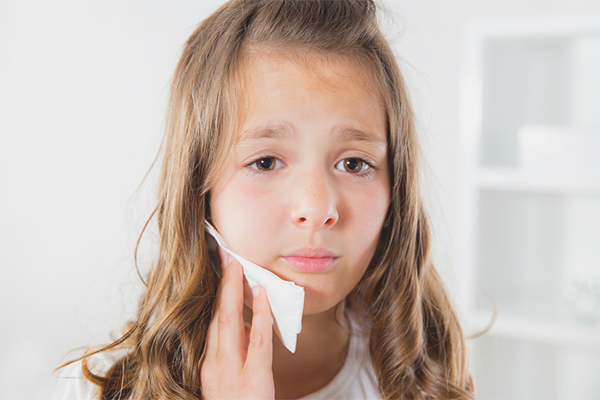
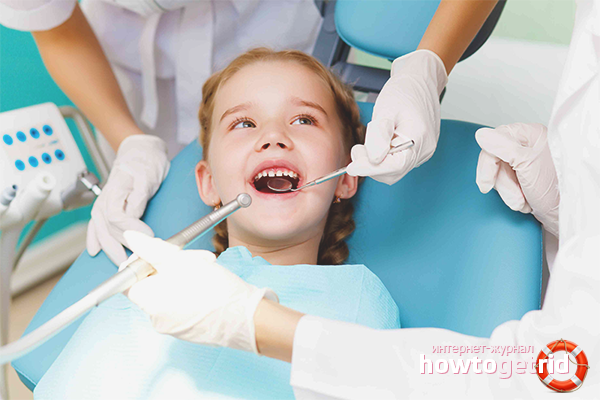

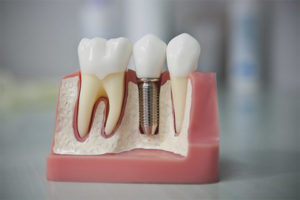

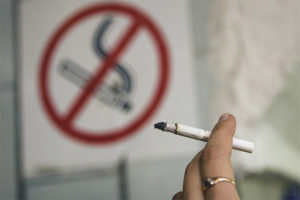
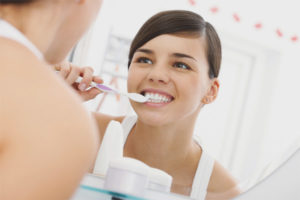
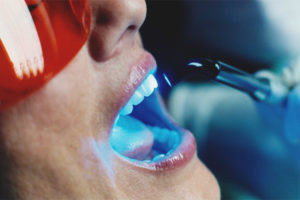
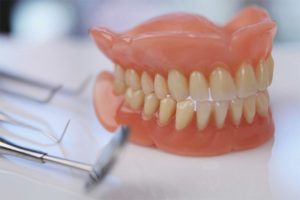

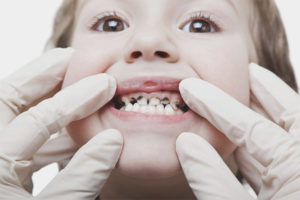
To send